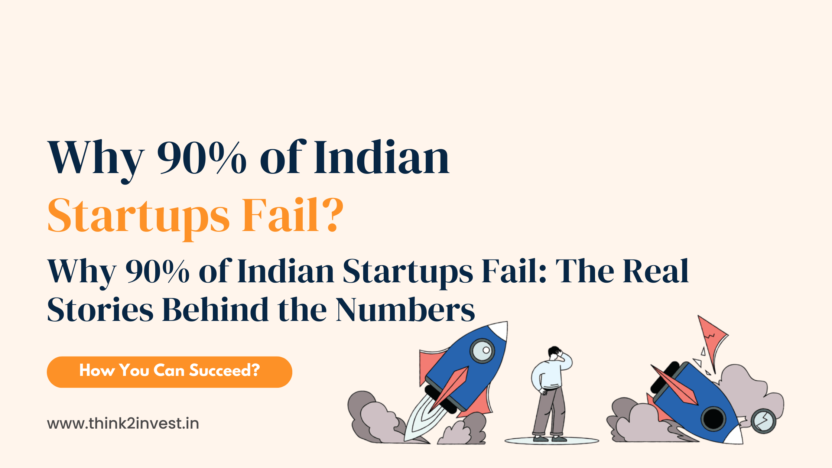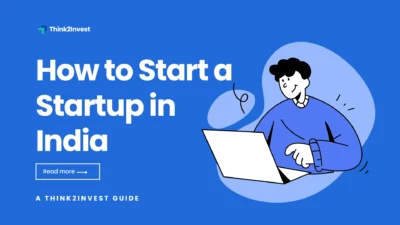Indian Startup Failures!
Imagine this: You’ve spent months — maybe years — building a dream startup. You’ve quit your job, maybe even borrowed money from family or investors. You launch your product with high hopes, but after a year or two, things don’t go as planned. Cash runs out. Customers don’t come. Investors lose interest. And finally, the shutters come down.
Despite India’s booming entrepreneurial scene — over 100,000 startups and 111 unicorns (billion-dollar companies) as of 2023 — most startups shut down within five years. Why? And more importantly, how can YOU avoid becoming another statistic?
Let’s dive deep.
Chapter 1: The Trap of Building Products Nobody Wants
One of the biggest reasons for startup failure is a simple but deadly mistake: building a product that nobody needs.
Take the story of SchoolGennie, a startup launched to sell ERP software to schools. Their idea sounded great on paper — making school management digital and easier. But they skipped one step: asking schools if they even needed it.
- Schools were happy with their old systems.
- The product took too long to launch.
- Costs piled up, but customers didn’t.
Result? Closure within a year.
👉 Lesson: Before investing lakhs (or crores), test your idea. Build a small version (MVP – Minimum Viable Product), show it to real customers, get feedback, and only then scale.
Chapter 2: The Silent Killer: Cashflow Mismanagement
Money can disappear faster than you think, especially in startups.
Russsh, a self-funded logistics startup, had a promising model — hyperlocal delivery of anything you wanted. But good ideas aren’t enough.
- They couldn’t raise enough money to compete.
- Operational costs kept rising.
- A single founder meant all the stress and decision-making was on one person.
They shut down in 2019.
In fact, 47% of startups fail because they either run out of money or can’t raise new funds.
👉 Lesson: In the startup world, cash is oxygen. Manage it wisely. Track every rupee. Plan for tough times.
Chapter 3: The Importance of a Strong Team
Behind every successful startup is a team that balances each other.
But Lumos, a smart-switch startup, had a different story. The founders were brilliant but realized too late that they didn’t have the right skills for building hardware.
No matter how great the idea, without the right people, execution fails.
- Weak founding teams cause 23% of startup failures.
- Lack of complementary skills like marketing, tech, operations can sink the ship.
👉 Lesson: Don’t just start with friends or classmates. Build a team with diverse strengths who can handle different parts of the business.
Chapter 4: The Competition War
Imagine starting a new online grocery delivery app in a country where giants like BigBasket, Amazon, and Grofers already exist.
This was the fate of PepperTap.
Despite raising $51 million in funding, they struggled:
- High operational costs.
- Heavy competition offering deep discounts.
- No way to scale sustainably.
By 2016, they had to shut down.
👉 Lesson: Before entering a crowded market, figure out your unique advantage. Find your niche, or be prepared for a brutal price war.
Chapter 5: The Regulatory Storm
Koinex was India’s leading cryptocurrency exchange in 2017. Business was booming — until RBI (Reserve Bank of India) decided to ban banks from dealing with crypto exchanges.
Koinex’s transactions froze. Investors panicked. They had no choice but to shut down in 2019.
Regulatory issues cause 19% of failures in India, especially in industries like fintech, crypto, and health tech.
👉 Lesson: Study the legal landscape before entering sensitive sectors. Hire good legal advisors. Be ready for sudden policy changes.
Chapter 6: The Innovation Deficit
Here’s a harsh truth: Many Indian startups simply copy Western ideas without innovation.
Unlike China or Japan, India lags behind in patent filings. We often don’t create original solutions for Indian problems.
Example: Edtech startups trying to copy U.S. models often failed because Indian classrooms, teachers, and students needed different solutions.
👉 Lesson: Don’t just copy-paste ideas. Understand Indian customers. Solve real problems in a unique way.
Chapter 7: The Missing Mentor Factor
In India, most startup founders try to figure out everything alone.
But Silicon Valley’s biggest strength is its culture of mentorship — experienced founders guide new ones.
Lack of mentorship is linked to 95% of startup failures.
👉 Lesson: Find mentors early. Attend startup events, pitch competitions, incubators. Learn from people who have already failed and succeeded.
Chapter 8: The Unseen External Shocks
Sometimes, no matter how well you plan, external factors hit you hard.
- COVID-19 pandemic wiped out thousands of startups, especially in travel, events, and food sectors.
- Economic slowdowns, funding winters, and global crises can ruin even strong startups.
👉 Lesson: Build a business model that is resilient. Diversify revenue streams. Keep a buffer fund for emergencies.
Real Startup Failures at a Glance
| Startup Name | Sector | Reason for Failure |
|---|---|---|
| Koinex | Cryptocurrency Exchange | Regulatory ban |
| PepperTap | Online Grocery | Intense competition |
| Russsh | Logistics | Funding issues |
| Dazo | Food-Tech | Operational problems |
| HotelsAroundYou | Hotel Booking | Funding + Competition |
| Doodhwala | Milk Delivery | Low market traction |
| Roadstar.ai | AI/Analytics | Technology not ready |
How YOU Can Beat the Odds
If you’re dreaming of starting up — or already running your business — here’s the ultimate survival checklist:
Essential Startup Checklist
- Research your market deeply.
- Build a small prototype before investing big.
- Manage cash flow religiously.
- Form a strong, skilled team.
- Find mentors and advisors.
- Stay alert about legal changes.
- Focus on real innovation, not imitation.
- Prepare for bad times, even when things are good.
Final Words: Learn from Failures, Build for Success
Yes, the odds are tough.
Yes, most startups fail.
But remember — failure isn’t final.
Each story of a failed startup teaches valuable lessons. The entrepreneurs who succeed are the ones who listen, learn, adapt, and push forward with smarter strategies.
In India, the next wave of success stories will be built by those who understand the ground reality, not just the glamor of startup life.
Will you be one of them? 🌟





